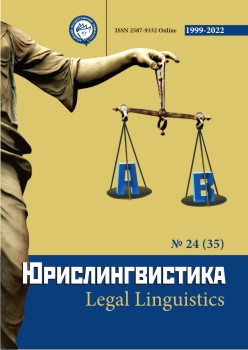Ancient Chinese Political and Legal Thought about Rewards and Punishments
Abstract
The article discusses ancient Chinese political and legal thought. In the modern world, such political and legal teachings as Confucianism, Taoism and Legalism have gained wide spread and influence. They occupy a special place in the spiritual culture of China and the life of modern Chinese society.
The PRC is at the stage of further modernization of Chinese society, which was initiated by the reforms of the 1970s. Traditional for China in any era of its development has been the appeal to the achievements of Chinese civilization.
One of the problems considered by the representatives of ancient Chinese political and legal thought is the problem of state administration. Among the various methods of government, ancient Chinese thinkers singled out, first of all, rewards and punishments. Within the framework of the political and legal views of ancient China, there were several approaches to rewards and punishments. The Confucians opposed the administration of the state on the basis of laws containing severe punishments. They believed that government should be based not on punishments, but on rewards. Supporters of Taoism recognized the method of rewards and punishments in government, but treated it negatively. In Mohism, ideas are expressed about the need to combine violent methods of control with moral forms of influence on people. Legalists come to the unequivocal conclusion that punishments are the most effective method of governing society.
The article concludes that the system of severe punishments developed by the Legalists underwent changes in the direction of mitigation and connection with the main postulates of Confucianism during the Han Empire. A system of severe punishments, coercion and violence, in a somewhat relaxed version, became the basis for the work of government bodies in subsequent centuries of Chinese history.
Downloads
Metrics
References
Антология мировой правовой мысли. Т.1. М., 1999.
Бичурин Н.Я. Китай в гражданском и нравственном уложении. М., 2002.
Древнекитайская философия. Т.1. М., 1994.
Древнекитайская философия. Т.2. М., 1994.
Жерне Ж. Древний Китай. М., 2004.
История китайской философии. М., 1989.
История политических и правовых учений. Древний мир. М., 1985.
Классическое конфуцианство. Т.2. СПб., М., 2000.
Конфуций. Я верю в древность. М., 1998.
Маршев В.И. История управленческой мысли. М., 2005.
Рубин В.А. Личность и власть в Древнем Китае. М., 1999.
Торчинов Е.А. Даосизм. «Дао – Дэ цзин». СПб.,1999.
Фицджералд Ч.П. История Китая. М., 2008.
Феоктистов В.Ф. Философские и общественно-политические взгляды Сюнь-цзы. М., 1976.
Царьков И.И. Уголовная политика древних цивилизаций / Право и политика. - 2010. - № 8. - С. 1480-1492.
Шан Ян. Книга правителя области Шан. М.,1993.
Copyright (c) 2022 Оксана Моисеева, Ольга Блинова

This work is licensed under a Creative Commons Attribution 4.0 International License.
The authors, which are published in this journal, agree to the following conditions:
1. Authors retain the copyright to the work and transfer to the journal the right of the first publication along with the work, at the same time licensing it under the terms of the Creative Commons Attribution License, which allows others to distribute this work with the obligatory indication of the authorship of this work and a link to the original publication in this journal .
2. The authors retain the right to enter into separate, additional contractual agreements for the non-exclusive distribution of the version of the work published by this journal (for example, to place it in the university depository or to publish it in a book), with reference to the original publication in this journal.
3. Authors are allowed to post their work on the Internet (for example, in a university repository or on their personal website) before and during the review process of this journal, as this may lead to a productive discussion, as well as more links to this published work (See The Effect of Open Access).











